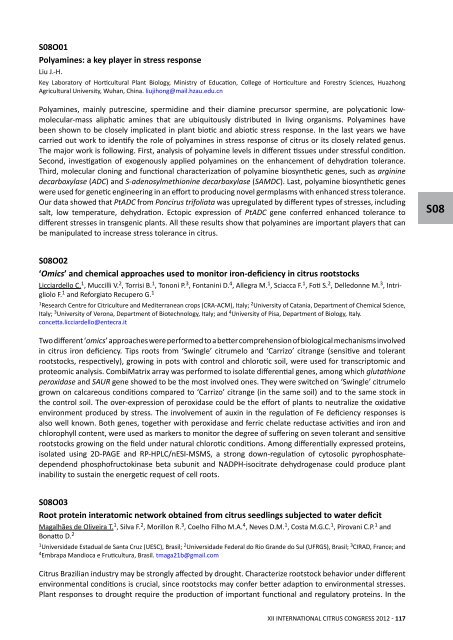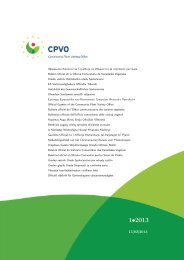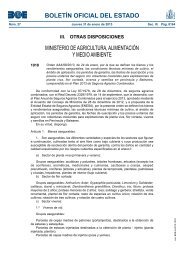- Page 3 and 4:
THE XII INTERNATIONAL CITRUS CONGRE
- Page 5 and 6:
WELCOME MESSAGE On behalf of the In
- Page 7 and 8:
Members Dr. FLORENTINO JUSTE Direct
- Page 9 and 10:
Poster presentations All posters ar
- Page 11:
SPONSORS XII INTERNATIONAL CITRUS C
- Page 15:
WE TAKE CARE Managing and adding va
- Page 19:
Scientific Programme
- Page 22 and 23:
SCIENTIFIC PROGRAMME Note: Sessions
- Page 24 and 25:
SESSION 01: Citrus germplasm and ph
- Page 26 and 27:
Poster ID Title S02P01 S02P02 S02P0
- Page 28 and 29:
Poster ID Title S02P37 S02P38 S02P3
- Page 30 and 31:
SESSION 05: BIOTECHNOLOGY Oral pres
- Page 32 and 33:
Poster ID Title S05P19 S05P20 S05P2
- Page 34 and 35:
Poster ID Title S06P08 S06P09 S06P1
- Page 36 and 37:
SESSION 08: Abiotic stress Oral pre
- Page 38 and 39:
SESSION 09: Postharvest physiology
- Page 40 and 41:
Poster ID Title S09P20 S09P21 S09P2
- Page 42 and 43:
Poster ID Title S10P01 S10P02 S10P0
- Page 44 and 45:
Oral ID Title S11O03 S11O04 S11O05
- Page 46 and 47:
Oral ID Title S12O04 S12O05 S12O06
- Page 48 and 49:
Poster ID Title S12P23 S12P24 S12P2
- Page 50 and 51:
Poster ID Title S13P01 S13P02 S13P0
- Page 52 and 53:
Poster ID Title S14P04 S14P05 S14P0
- Page 54 and 55:
SESSION 15: Fungal diseases Oral pr
- Page 56 and 57:
Poster ID Title S15P24 S15P25 S15P2
- Page 58 and 59:
Poster ID Title S16P06 S16P07 S16P0
- Page 60 and 61:
Poster ID Title S16P40 S16P41 S16P4
- Page 62 and 63:
Poster ID Title S17P17 S17P18 S17P1
- Page 64 and 65:
Poster ID Title S18P06 S18P07 S18P0
- Page 66 and 67:
Poster ID Title S20P01 S20P02 S20P0
- Page 68 and 69:
Poster ID Title S21P16 S21P17 S21P1
- Page 71:
Plenary Conferences PC01 The Spanis
- Page 74 and 75:
Drip irrigation introduced in the 8
- Page 76 and 77:
Global warming and its impact on cl
- Page 78 and 79:
egional, i.e. applied on an area-wi
- Page 80 and 81:
PC07 Biological control and citrus:
- Page 83 and 84:
W01 HLB control Convener: J.M. Bov
- Page 85 and 86:
mandarin cultivars such as `Fortune
- Page 87 and 88:
• Open: All growers have free acc
- Page 89 and 90:
Genetic restriction of fruit tree s
- Page 91 and 92:
W08 Global citrus industry collabor
- Page 93:
forced-air, vapor heat, cold, and i
- Page 97 and 98:
S01O01 Citron germplasm in Yunnan,
- Page 99 and 100:
citrus cultivars are interspecific
- Page 101 and 102:
S01P06 Diversity analysis of citrus
- Page 103:
Our results demonstrate that the ci
- Page 107 and 108:
S02O01 The triploid mandarin breedi
- Page 109 and 110:
S02O06 Citrus breeding in South Afr
- Page 111 and 112:
furanocoumarins. However, a particu
- Page 113 and 114:
or horticultural traits, but truene
- Page 115 and 116:
S02P06 Preliminary research on gene
- Page 117 and 118:
S02P11 Development CTV resistant ci
- Page 119 and 120:
S02P16 Mechanism of seedlessness in
- Page 121 and 122:
S02P21 Haploid and polyploid hybrid
- Page 123 and 124:
agronomically characterized 79 hybr
- Page 125 and 126:
2011. Early production was achieved
- Page 127 and 128:
are vigorous with nearly round-shap
- Page 129:
Session 03 CITRUS GENOMICS S03
- Page 132 and 133:
S03 of large genomic regions. Seque
- Page 134 and 135:
S03 S03O07 Analysis of the clementi
- Page 136 and 137: S03 and recombinant DNA technology.
- Page 138 and 139: S03 TFs. Some of them are MADS-box
- Page 140 and 141: S03 S03P13 Fast and cost-effective
- Page 143: Session 05 BIOTECHNOLOGY S05
- Page 146 and 147: S05 the regulation of carotenogenes
- Page 148 and 149: S05 stoma density, size and opening
- Page 150 and 151: S05 S05P02 Comprehending crystallin
- Page 152 and 153: S05 S05P07 D-limonene downregulatio
- Page 154 and 155: S05 to this disease. Development of
- Page 156 and 157: S05 tomato constitutively express L
- Page 158 and 159: S05 deletor’ technology is an eff
- Page 160 and 161: S05 sour orange seedlings. The embr
- Page 162 and 163: S05 biodegradable makes them attrac
- Page 165 and 166: S06O01 Effect of male-female intera
- Page 167 and 168: S06O06 Endogenous factors affecting
- Page 169 and 170: lowest levels at fruit mature stage
- Page 171 and 172: (5.6% of the total citrus area) wit
- Page 173: almost disappeared and total yield
- Page 177 and 178: S07O01 Citrus developmental researc
- Page 179 and 180: S07O06 Exploring microRNA target mo
- Page 181 and 182: set of the orange varieties ‘Wash
- Page 183 and 184: S07P10 Transcript accumulation of f
- Page 185: Session 08 ABIOTIC STRESS S08
- Page 189 and 190: S08O06 Roots are necessary for the
- Page 191 and 192: ‘Citremon’ in terms of salinity
- Page 193 and 194: was to compare in vitro behavior of
- Page 195 and 196: three replications was used. The me
- Page 197 and 198: 05, 2010 -1 1 and 2011-2012. In thi
- Page 199 and 200: S08P22 Micromorphological studies o
- Page 201: Session 09 POSTHARVEST PHYSIOLOGY A
- Page 204 and 205: S09 Nevertheless our knowledge on i
- Page 206 and 207: S09 S09O08 A new prespective in con
- Page 208 and 209: S09 S09O13 Potassium sorbate increa
- Page 210 and 211: S09 S09P05 Quality attributes of Va
- Page 212 and 213: S09 may be operating in the differe
- Page 214 and 215: S09 with the aim of better understa
- Page 216 and 217: S09 S09P20 Modulation of host respo
- Page 218 and 219: S09 S09P25 Effects of fluorescent P
- Page 220 and 221: S09 S09P30 Selection and in vitro e
- Page 222 and 223: S09 S09P35 Curative and protective
- Page 225: Session 10 WATERING AND NUTRITION S
- Page 228 and 229: S10 water use efficiency, governmen
- Page 230 and 231: S10 S10O08 Uptake of 44Ca and 15N b
- Page 232 and 233: S10 S10P03 Recover of plugged dripp
- Page 234 and 235: S10 S10P08 Predicting the impact of
- Page 236 and 237:
S10 were evaluated. Yield, fruit qu
- Page 238 and 239:
S10 optimum value. Available nitrog
- Page 240 and 241:
S10 and soil samples (0-10,10-20, 2
- Page 242 and 243:
S10 on gray upland soil were used.
- Page 245:
Session 11 CULTURAL PRACTICES AND M
- Page 248 and 249:
S11 compare ‘Valencia’ trees on
- Page 250 and 251:
S11 horticultural, engineering, and
- Page 252 and 253:
S11 composition, and growth paramet
- Page 254 and 255:
S11 cost and thereby increase the p
- Page 256 and 257:
S11 checked. The objective is to se
- Page 258 and 259:
S11 management. Due to the lack of
- Page 261:
Session 12 CITRUS HLB AND OTHER BAC
- Page 264 and 265:
S12 S12O03 A new insect vector of C
- Page 266 and 267:
S12 greater for T&J (255&220) than
- Page 268 and 269:
S12 We developed a new MLVA (MultiL
- Page 270 and 271:
S12 have not been completely fulfil
- Page 272 and 273:
S12 only occurred in the latter. Ta
- Page 274 and 275:
S12 not indicate effect of the prev
- Page 276 and 277:
S12 mechanism against “Candidatus
- Page 278 and 279:
S12 scheme and three adapted from s
- Page 280 and 281:
S12 for this disease, we started th
- Page 282 and 283:
S12 S12P32 Bacteriostatic and bacte
- Page 284 and 285:
S12 Here, we report a novel diagnos
- Page 286 and 287:
S12 S12P41 Gaining experience with
- Page 289:
Session 13 FRUIT FLIES S13
- Page 292 and 293:
S13 S13O03 Multiple insecticide res
- Page 294 and 295:
S13 With abundant production worldw
- Page 296 and 297:
S13 S13P05 Role of phytosanitary su
- Page 298 and 299:
S13 (Mauri Pinnacle protein®) on a
- Page 300 and 301:
S13 S13P14 Evaluation of mass trapp
- Page 303 and 304:
S14O01 Recent developments on Citru
- Page 305 and 306:
assay was performed to find out if
- Page 307 and 308:
on stems and trunks of sensitive ci
- Page 309 and 310:
invasion by the other. The relative
- Page 311 and 312:
S14P08 Population variation of Citr
- Page 313 and 314:
Spatial analysis showed that small
- Page 315 and 316:
was carried out for five years on g
- Page 317 and 318:
detected in the main trunk and root
- Page 319 and 320:
S14P28 Setting up and evaluation of
- Page 321 and 322:
the nurseries, which started sellin
- Page 323:
Session 15 FUNGAL DISEASES S15
- Page 326 and 327:
S15 fluorescent pigment in the firs
- Page 328 and 329:
S15 It produces orange-brown lesion
- Page 330 and 331:
S15 that only ascospores are respon
- Page 332 and 333:
S15 the northwestern and 64 from th
- Page 334 and 335:
S15 Almost all of the high-fruit-qu
- Page 336 and 337:
S15 and 41 kg, UTC trees produced 3
- Page 338 and 339:
S15 S15P23 Expression profiles of d
- Page 340 and 341:
S15 S15P28 Optimization of copper a
- Page 343:
Session 16 ENTOMOLOGY AND PEST CONT
- Page 346 and 347:
S16 Spanish citrus orchards for man
- Page 348 and 349:
S16 Daily fertigation required by A
- Page 350 and 351:
S16 most important of a narrow-rang
- Page 352 and 353:
S16 citrus flowers causing importan
- Page 354 and 355:
S16 design is RCB with 4 treatments
- Page 356 and 357:
S16 Suppression of citrus psyllid p
- Page 358 and 359:
S16 in the area, the California Red
- Page 360 and 361:
S16 among three natural enemies of
- Page 362 and 363:
S16 a high incidence of damaged fru
- Page 364 and 365:
S16 spider mite performance on citr
- Page 366 and 367:
S16 S16P32 Monitoring and Managemen
- Page 368 and 369:
S16 S16P37 Carbendazim, mancozeb an
- Page 370 and 371:
S16 result except S. pygmaeus larva
- Page 372 and 373:
S16 a Potter spray tower (spray dep
- Page 375 and 376:
S17O01 New citrus variety evaluatio
- Page 377 and 378:
S17O06 New promising citrus hybrids
- Page 379 and 380:
to 1980. These genotypes were exami
- Page 381 and 382:
thus being most new plant material
- Page 383 and 384:
the production period of this crop
- Page 385 and 386:
S17P19 Acceptability of ‘Fremont
- Page 387 and 388:
S17P24 Molecular characterization o
- Page 389:
assessed. Fruits were collected whe
- Page 393 and 394:
S18O01 Reflections on a career in c
- Page 395 and 396:
attained with the use of the tradit
- Page 397 and 398:
S18O10 ‘Forner-Alcaide 5’: a ci
- Page 399 and 400:
selections (‘Caffin’ and ‘Spi
- Page 401 and 402:
eshni), Citrus volkameriana, Citrus
- Page 403 and 404:
higher proportion of split fruits (
- Page 405 and 406:
S18P21 Crop production of ‘Okitsu
- Page 407 and 408:
were found that the order of drough
- Page 409:
larger, while trunk girth was not a
- Page 413 and 414:
S20O01 Flavanones are involved in t
- Page 415 and 416:
S20O06 Evaluation of the anticancer
- Page 417 and 418:
S20P04 The leaves of Mediterranean
- Page 419:
S20P09 Dissipation and residue of 2
- Page 423 and 424:
S21O01 Biochemical and molecular me
- Page 425 and 426:
e directly commercialized and repre
- Page 427 and 428:
S21P04 Change in nonvolatile flavou
- Page 429 and 430:
S21P09 Characterization of fruits o
- Page 431 and 432:
have any effect on the content of p
- Page 433:
when exposed to the aroma. A non-su
- Page 437 and 438:
S22O01 The development of citrus in
- Page 439 and 440:
S22O06 Evolution of development mod
- Page 441 and 442:
S22P04 The experience of the Entre
- Page 443:
S22P09 Price evolution of ‘Clemen
- Page 447 and 448:
A Abdel Fattah A. 249 Abdelgallel A
- Page 449 and 450:
Carra A. 89 Carrera R.R. 108 Carril
- Page 451 and 452:
Flores R. 77, 84, 235, 237 Flores S
- Page 453 and 454:
Kahn T. 27, 29, 30, 215, 310, 312 K
- Page 455 and 456:
Miles A.K. 263 Miller A.M. 83 Milon
- Page 457 and 458:
Rajabi A. 130 Rajaei H. 129 Rambeau
- Page 459 and 460:
Tena A. 275, 280, 288 Teresani G. 1
- Page 462:
ORGANIzERS INSTITUTIONAL SPONSORS C




